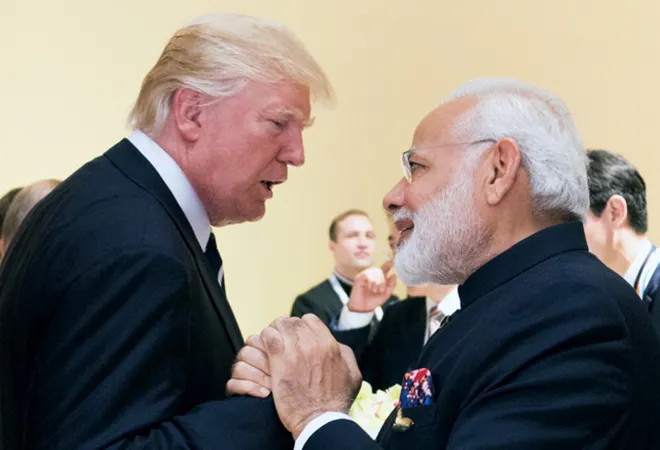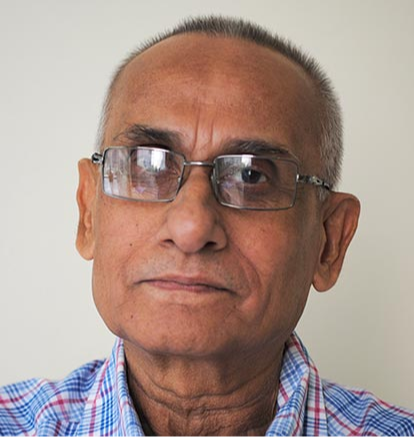-
CENTRES
Progammes & Centres
Location

By the end of UPA II, there was a general feeling among commentators on India’s foreign policy that a lot needed to be done which Manmohan Singh government left undone or was incapable of doing. Prime Minister Modi entered office with a foreign policy bang, inviting SAARC heads of governments at his swearing in ceremony and at once people were thrilled to have discovered the right man at the right time who would fix all deficiencies on the foreign policy front of his predecessor government. As we are inevitably moving towards the end of NDA II, and the general elections next year, it is time to have a look at the state of our foreign policy today.
Let us recollect that after coming to power Modi selected Bhutan as the country of his first foreign visit which was quickly followed by a trip to Nepal. He coined the phrase “neighbourhood first” as the guiding star of our foreign policy while quickly rephrasing Narasimha Rao’s “Look East” into “Act East” policy. Not only did he start travelling through the neighbourhood in quick succession; he made a surprise visit to Lahore on 25 December 2015 to wish his then Pakistani counterpart Nawaz Sharif on his birthday as also to attend the marriage of his granddaughter. Already in September 2014 Modi had welcomed Xi Jinping to India when they jointly agreed to uphold “Peace on the Border”. India truly looked like in the driver’s seat resetting South Asian relations and adding the necessary heft to Sino-Indian relations.
All this looks like a distant and unrealised dream now.
During the last four years India has given an impression, not consistently though, that in these volatile times her foreign policy future lies more with the US, Japan and Australia than with anybody else.
On the one hand, we have enhanced our strategic relationship with the US, notwithstanding her questionable dependability, decided to make significant defence purchases from her turning the US into a major defence partner supplying approximately 17% of our imports between 2013-17, entered into the Logistics Exchange Memorandum of Agreement (LEMOA) with the US which would allow our two militaries to work closely and use each other’s bases for repair and replenishment of supplies and visit ports whenever needed, expanded the Malabar naval exercises started in 1992 with US to include Japan in 2015 as a permanent partner, and planned to expand India Japan Dialogue on Africa initiated in 2010 to include in 2016 the idea of an Africa-Asia Growth Corridor implicitly as an alternative to Belt and Road project launched by China three years back.
On the other hand and reinforcing our said choice of friends, we have refused to even formally attend the Belt and Road Conference in Beijing in May 2017 being the only major country to do so, showed lack of enthusiasm in inviting Chinese investment to India (confining it to a mere $2bn when Mr Xi had promised an investment of $20bn during his visit alone in 2014), expressed strong opposition to CPEC on sovereignty issues and irritation at China’s growing presence in South Asia. Apart from having major and minor border issues with China for a long while, “upholding peace on the border” came under severe strain during the prolonged Doklam stand- off between the two countries during the last year. Sudden imposition of restrictions on official attendance in Dalai Lama events (“throwing Dalai Lama under the bus” as it has been dubbed) to please the Chinese before PM Modi’s Wuhan summit is not expected to cut much ice.
Although Russia still remains our most important defence partner supplying 62% of our defence needs during 2013-17, we have neglected our age-old warm and close relationship of trust and friendship with that country for quite some time, a trend which has continued during the past four years. In some sense, Russia has compensated India’s coolness towards her by developing warm relations with Pakistan and it would be very difficult to put India-Russia relations back on the past track.
While India, along with Pakistan, in 2016 has become full members of the SCO (Shanghai Co-operation Organization) which sometimes is looked upon as a China-led counter to NATO, she has also agreed to join a coalition with “like-minded” democracies, US, Japan and Australia, to form the Quadrilateral Security Dialogue or QUAD in November 2017 –an idea which had remained in a limbo since Japanese Prime Minister Shinzo Abe proposed it in 2007,to ensure “respect for international law” and “rule-based order in the Indo-Pacific” in clear reference to China’s flouting of territorial, maritime and trade rules in South China Sea. Although the QUAD does not formally aim at containing China, many commentators have likened it to be the first step towards an Asian NATO. Meanwhile, and strangely, a few months earlier, in June 2017, India refused to entertain Australia’s wish to partner Malabar naval exercises which, some guess, was due to India’s unwillingness to cross Beijing’s imagined red line. But then, India had also been ignoring the red line, if there was one, in quietly but firmly rebuffing China on many an occasion since 2010 when it refused to endorse One China policy for China’s questionable stand on Kashmir and Arunachal Pradesh or by suspending all bilateral military relations with China for the latter’s refusal to grant visa to the commanding Indian general of Northern Command in Kashmir or during Modi’s time by stonewalling the BRI. How Australia’s entrance to the Malabar exercises would have especially infuriated China was hard to guess.
Coming to the neighbourhood, we find similar contradictory signals. Our big talks on connectivity with the neighbours through expanded road, rail, energy linkages, and enhanced transport and trade facilities have produced only limited fruits.
On a number of projects on rail, road, waterways and energy linkages with Bangladesh notable progress has indeed been made. But apart from this, nothing remarkable has happened till now and several mutually agreed upon projects with Myanmar, Thailand and Nepal have moved very slowly missing a number of deadlines for completion (e.g., Kaladan Multi-Modal Transit Transport Project, the Terai Road Project or Pancheshwar Hydro Power Project, or Jogbani-Biratnagar Rail Link—all conceived on or before 2010, to name a few). The BBIN Motor Vehicles Agreement among Bangladesh, Bhutan, India and Nepal has not fructified as planned and BBIN rail link remains at the level of an idea. While road linkage projects with Nepal are moving very slowly, possible rail linkages are being thought of very recently. The only remarkable development is the inauguration of the transnational petroleum pipeline by the two Prime Ministers in May this year when K. P. Oli came to visit India. With Sri Lanka and Maldives India’s moves on port and airport projects have been ill-timed/poorly managed which left enormous vacuum to be filled in by China. So far as Pakistan is concerned, our relationship has reached ground zero.
Not that the slow progress on projects is always due to India’s fault. Complex factors and issues have often intervened demanding the sagacity of the governments involved. But it is also true that we have failed to give the lead and inject momentum to move ahead together contradicting the hopes and expectations that Prime Minister Modi had generated upon entering office. On top of this, the unfortunate blockade that India willy-nilly imposed on Nepal on issues which were primarily domestic for the latter has not only soured India-Nepal relations for a long time to come but more than that, it has given wrong signal to our other neighbours about dependability of India as a trusted friend.
Overall then, our foreign policy in the recent past has left much to be desired: it has been more an audio-visual exercise than rich in substance; it is deplorably short on consistency and direction. Foreign policy must be based on self-interest no doubt, but so far as especially our neighbours are concerned the pursuit of self-interest can indeed be benevolent.
The views expressed above belong to the author(s). ORF research and analyses now available on Telegram! Click here to access our curated content — blogs, longforms and interviews.

Professor in Political Science, Calcutta University (Retired 2008). Formerly Dean, Faculty of Arts, Calcutta University; Visiting Fellow in Political Science and Associate, Committee on South ...
Read More +
Samantha Keen Researcher Strengthening National Climate Policy Implementation (SNAPFI) project University of Cape Town South Africa
Read More +